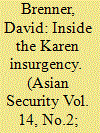| Srl | Item |
| 1 |
ID:
160690


|
|
|
|
|
| Summary/Abstract |
Since 2012 Myanmar’s oldest ethnic rebel group, the Karen National Union (KNU), has sought for considerable rapprochement with the government. To many, this seemed to be the direct outcome of wider political transition in Myanmar. This article proposes an alternative explanation. Based on extensive field research and an emerging literature on armed groups, it demonstrates that the group’s rapprochement with the government was driven by leadership struggles between two rival factions within the KNU. At the core of this contestation are shifting internal power relations, which resulted from military pressures and geopolitical transformations in the Myanmar-Thai borderlands. These findings point to significant shortcomings of Myanmar’s peace process. They also contribute to the field of Conflict and Security Studies with much needed primary source data on the internal politics of insurgency, which shows how dynamics of civil war are driven by an interplay between forces on different levels of analysis.
|
|
|
|
|
|
|
|
|
|
|
|
|
|
|
|
| 2 |
ID:
163720


|
|
|
|
|
| Summary/Abstract |
In explaining political violence, Conflict and Security Studies commonly focuses on the rational decision-making of elites. In contrast, this article considers the everyday aspirations of rebel grassroots. Understanding their lifeworlds is important, as their interaction with rebel elites shapes the collective trajectories of revolutionary movements and, thus, wider dynamics of war and peace. This article analyzes the social practice of revolutionary karaoke music in Myanmar's Kachin rebellion as a window into these hidden social dynamics of political violence. It does so by merging a relational reading of rebel figurations with a visual ethnographic methodology that moves beyond the textual study of propaganda lyrics. Instead, it analyzes the audio-visual aesthetics and social practices of revolutionary karaoke. This critical mode of inquiry reveals the emotional dimension of rebellion, that is, its appeal to affect rather than reason. It also suggests that revolutionary cultural artifacts can be more than just instrumental propaganda vehicles for instilling elite ideologies into un-agential masses. Indeed, the article shows that many young Kachin are not just passive consumers of propaganda. In karaoke bars and music studios, they actively perform rebellion. In so doing, they coproduce their own rebel subjectivities and rebel political culture at large.
|
|
|
|
|
|
|
|
|
|
|
|
|
|
|
|